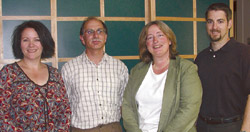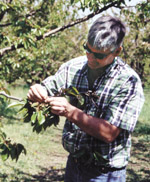SUSTAINABILITY profile
by Cameron Woodworth
This article was originally published in September 2004

Sustainability at PCC — measuring progress, setting goals
(September 2004) — It’s no secret that sustainability is a central part of PCC’s mission. After all, PCC stores are full of organic and natural foods that are good for our health and the environment.
Beyond the obvious, though, PCC is also involved in a wide variety of broader sustainability efforts. These range from helping local farmers transition to organic agriculture, to programs supporting Fair Trade and sustainable seafood.
PCC’s Sustainability Task Force was launched last year to document PCC’s sustainability record. It includes one staff, two PCC members, and three PCC Board members.
“The task force grew from the Board of Trustees’ desire to see PCC’s commitment to sustainability become a measurable force in all areas of our business,” says Lori Ross, PCC’s director for store development and the staff member assigned to the task force.

“As we began to identify the numerous facets of sustainability, we quickly realized that PCC’s business as usual was highly sustainable. PCC has always operated with great respect to our members, our staff, our product mix and our business relationships. Responsibility to these groups, our environment and our community is a key factor in being a sustainable business.”
Sustainability generally is defined as having three cornerstones: economic growth/sustainable business, environmental balance/eco-efficiency and social progress/corporate social responsibility. “We’ve identified a vast number of ways that PCC can effect change,” Ross says. “And in each case, we’re striving to developing meaningful measures, both to benchmark current operations and set goals for the future.”
“Over the last few years, thanks to significant improvements in operations, PCC has established financial sustainability,” says Chantal Stevens, task force chairwoman.
“At the same time, it has continued being a leader in the local community through its support of the PCC Farmland Fund, local food banks and schools; as a community-owned food cooperative; a supporter of local, sustainable agriculture, and an educator on issues such as genetically engineered food and organic standards.”
In the area of social corporate responsibility, PCC has many important programs in the works. The co-op has put energy into providing Fair Trade coffee, tea and chocolate and is working on reliable sources of quality Fair Trade fruit, including bananas. PCC’s new partnership with both the Seattle and Monterey Bay aquariums to promote sustainable seafood is the first of its kind. If you haven’t picked up a Seafood Watch pocket guide, find one at any PCC seafood counter.
The task force is identifying many areas where PCC already has instituted programs to be environmentally friendly. These entail capital projects for green building opportunities, increased recycling and composting throughout the co-op, promoting the use of renewable energy sources when possible, and reducing energy and water consumption in the stores.

PCC’s new Fremont store, which opened last summer, is in many ways the hallmark of PCC’s sustainability efforts. “The store is designed to be as eco-friendly as possible,” says Ross. Full-spectrum and accent lighting wattage is well below Washington’s already low energy code, and photocells and occupancy sensors turn off lights when they’re not needed.
Construction materials and insulation contain recycled products. Counter-tops were manufactured using recycled paper. Space heating, air conditioning, hot water heating and refrigeration systems are all interconnected so that waste heat or cool air from one system can be utilized by another.
Solar-selective glass reduces the need for air conditioning throughout the store. Solar panels generate power that feeds the local power grid.
One of PCC’s most important contributions to sustainability outside the stores is the PCC Farmland Fund — an independent, community-supported 501(c)3 non-profit land trust created in 1999. The United States loses approximately two acres of farmland, including some of the most fertile and productive land, every minute, according to the American Farmland Trust.
The PCC Farmland Fund works to purchase threatened farmland in Washington state and move it into organic production. The Farmland Fund has helped save farmland in several ways: purchase, agricultural conservation easements, support to other organizations saving farmland, and collaboration. (see PCC Farmland Fund)
“The major thrust of our upcoming work is to showcase how sustainability is good business,” says Ross. “Doing right can benefit a business’ bottom line. Sustainability is a strong business model.”
